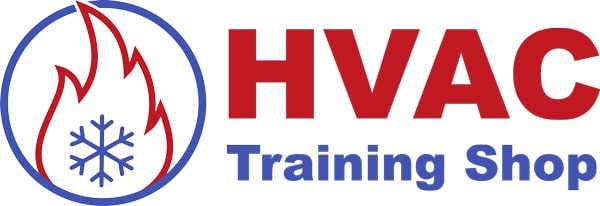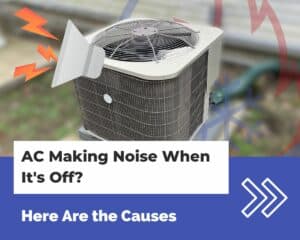Picture this: It’s a hot, humid day outside. Next thing you know, your AC suddenly stops cooling.
Time to check things out.
So you go outside to look at your AC unit—but you find that your AC line has turned into a chunk of ice.
What do you do?
A frozen AC line indicates that there is an issue with your AC system. The two most common causes of a frozen AC line are airflow restrictions and refrigerant issues.
In this article, I’ll go over what you should do if your AC line is frozen. I’ll also go over everything that causes a frozen AC line—so you’ll know what to check and how to fix your AC.
What you should do if your AC line is frozen
If your AC line is frozen, the first thing you need to do is turn off your AC and let the line defrost.
Next, take a look at your airflow and refrigerant systems to figure out what’s causing the freezing.
Here are the steps that you should follow if your AC line is frozen:
I’ll go over them below.
Let the AC line defrost
If your AC line is frozen, the first thing that you need to do is let it defrost. You should also check your AC coil—if your AC line is frozen, there’s a good chance that your AC’s evaporator coil is frozen too.
Unfortunately, it may take some time for everything to defrost.
You may be tempted to chip away at the ice or melt it with a blow torch. Don’t do that—you’ll only damage your AC unit and cause an even larger headache.
Your AC line will defrost much faster than the coil. The best way to defrost the coil is to run the AC in “fan-only” mode. Fan-only mode will circulate room-temperature air from your home through your AC unit, defrosting the coil in the process.
Check for airflow restrictions
Airflow restrictions are one of the most common causes of frozen AC lines.
While you’re waiting for your AC line and coil to defrost, you should check your AC system for airflow restrictions.
Here’s what you should do when checking your AC system for airflow restrictions:
- Change the air filter
- Check the air vents for blockages
- Check the blower for issues
- Check for a clogged evaporator coil
I’ll go over them below.
Change the air filter
A dirty air filter is one of the most common causes of airflow restriction in an AC system. If your air filter gets too dirty, it will restrict airflow and cause your AC line to freeze.
Worse yet, an excessively dirty air filter can collapse and get stuck in your blower and clog up your evaporator coil.
I recommend changing your air filter every 1-2 months to ensure that it doesn’t cause too much airflow blockage in your AC system.
Check the air vents for blockages
A blocked air vent is one of the most overlooked causes of problems in an AC system. A blocked-up air vent will create airflow restrictions and cause your AC line to freeze.
Check all of the supply and return vents in your home to see if they are blocked.
Keep all furniture such as couches and curtains away from air vents.
Anything that’s less than 1 foot to an air vent is too close.
It’s also important to take a peek inside your air vents—If an object gets stuck in one of your vents, your AC will lose airflow and freeze up.
One other thing to check is your dampers. Some ducts and registers have dampers on them. These dampers have a lever or a slider that allows you to open or close them.
You should never completely close off a damper—doing so will starve your AC unit of airflow and cause it to freeze up.
However, you may have a balancing damper in your system. Balancing dampers are designed to be partially closed off to balance the airflow throughout your home.
If you’re unsure about damper positions, call your local HVAC professional to assess your system.
Check the blower for issues
The blower is the fan that circulates air through your AC system and your home.
If your blower isn’t working properly, your AC system will have trouble cooling your home and your AC line will freeze up.
So what kind of issues can your blower have? Here are a few:
- Blower wheel damaged. Blower fan wheels can get damaged if they rub up against your air handler or if your air filter collapses.
- Blower wheel dirty. Blower fan wheels can get dirty over time—especially if your air filter has air leaks around it, or if you run your system without an air filter.
- Blower motor bad. Blower motors can overheat and go bad, especially if they’re running with too much airflow restriction for an extended period.
- Blower motor capacitor bad. Blower motor capacitors are needed for PSC blower motors to run.
- Fan belt broken. Some air handler units (mostly older ones) use belt-driven blowers. If the fan belt breaks, then you’ll lose airflow through your AC unit and your line will freeze.
- Blow motor overload tripped. Some blower motors have overloads built into them that will trip if the motor overheats. If your blower motor’s overload has tripped, then you need to figure out why it’s overheating (usually due to airflow issues).
If your blower is having issues, check out my article here:
Check for a clogged evaporator coil
A clogged evaporator coil will cause your AC line to freeze in no time at all.
Why does that happen?
If your evaporator coil gets clogged, air won’t be able to flow through it. Without airflow, your evaporator coil won’t absorb heat, and the coil and AC line will freeze up.
So how does an evaporator coil get clogged up in the first place? And what can you do to prevent it from getting clogged up?
Here are a few causes of a clogged evaporator coil:
- Air leaks in your AC system. Air leaks in your air handler or return ductwork can cause dirty unconditioned air to infiltrate your AC system. If there is an air leak after your air filter, dirty air will get inside your evaporator coil and clog it up.
To prevent air leaks in your AC system, ensure that all panels are closed and there are no cracks or holes in your ductwork. - Collapsed air filter. An excessively dirty air filter will create a huge pressure imbalance—enough to cause the air filter to collapse. If the air filter collapses, dirty air will flow right into your evaporator coil, clogging it up.
To prevent your air filter from collapsing, change it before it gets too dirty. I recommend changing your air filter every 1-2 months. - No air filter. If you run your AC system without an air filter, dirty air will flow right into your evaporator coil. All the dust from your home will eventually clog up your evaporator coil. Always use an air filter in your AC system.
If your AC’s evaporator coil is clogged up, check out my article for information on how to fix it:
Check for refrigerant issues
Airflow restrictions aren’t the only thing that can cause a frozen AC line—issues in your AC’s refrigerant system can cause your AC line to freeze up as well.
If your AC line is frozen, there are two things to check in your AC’s refrigerant system:
I’ll discuss them below.
Check for refrigerant leaks
If your AC is leaking refrigerant, it might cause your AC line to freeze up.
Why does that happen?
A refrigerant leak will cause your AC line to freeze up because your AC will become undercharged.
An undercharged AC will lead to lower pressures and lower temperatures in the AC line.
If the temperature of the refrigerant in your AC line dips below freezing, then ice will form on the line.
So what’s the best way to find a refrigerant leak?
One way is to use a refrigerant leak detector.
A leak detector will tell you if it “smells” any refrigerant in the air around your AC.
Once you find a refrigerant leak with the leak detector, you can pinpoint the leak using a soapy water mixture.
Spray the soapy water mixture in the suspected leak area and look for bubbles to form. Once you see bubbles, that’s where the leak is.
So where should you look for refrigerant leaks?
Here are a few places where refrigerant leaks can occur:
- Evaporator coil
- Evaporator coil capillary tubes
- Condenser coil
- Line set
- Connections/fittings
If you find a leak in your AC system, the entire system will need to be drained down before the leak can be repaired. You’ll need to hire an HVAC professional for this.
Check for refrigerant blockages
A refrigerant blockage is another thing that will cause your AC line to freeze.
A refrigerant blockage occurs when a component in your AC’s refrigerant system inhibits refrigerant flow.
Here are a few things that can cause a refrigerant blockage:
- Filter drier
- Metering device (such as a capillary tube or thermostatic expansion valve)
- Broken solenoid valve (found on AC systems with long line sets)
So why do refrigerant blockages cause your AC line to freeze up?
It’s due to the pressure drop inside your AC.
The pressure loss in your AC’s refrigerant system causes the temperature of your AC line to dip below freezing temperature. Then ice will form on the surface of your AC line.
How do you know if there is a refrigerant blockage in your AC system?
The easiest way to tell is to look for temperature drops across your devices.
If there is an excessive temperature drop (more than 1 or 2°F) across a part then there’s a good chance of blockage in the component.
The only exception to this is the metering device—metering devices are designed to restrict flow, so you will always see a temperature drop across a metering device.
However, if the temperature of the refrigerant leaving the metering device is below freezing, then that’s a cause for alarm—the metering device has a blockage or is broken.
So what do you do if you your AC system has a refrigerant blockage?
The blockage will need to be removed.
Depending on the location of the blockage, the component will need to be cleaned out or replaced.
In any case, the repair will need to be done by an HVAC professional.



